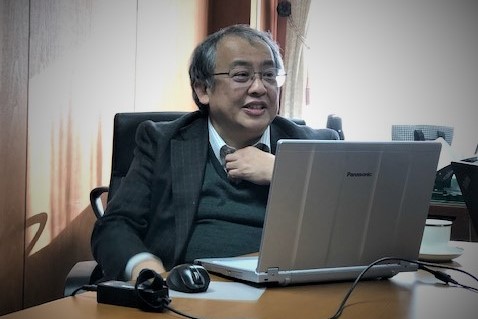On a sunny Winter afternoon, the Nagaoka Review team sat down with the Vice President of the Nagaoka University of Technology, Professor Kiyoshi Ohishi to get to know him better and discuss his view on the city of Nagaoka and what the Nagaoka University of Technology is doing in part to drive social innovation in the city and beyond.
Good afternoon, Professor Ohishi. Thank you for making time to meet with the Nagaoka Review team today. Do tell us more about yourself
I am Kiyoshi Ohishi, and I am originally from Tochigi prefecture. I have been working at the Nagaoka University of Technology (NUT) for 27 years. Before being invited by Professor Isao Takahashi to NUT, I was at the Osaka Institute of Technology for 7 years. I am originally from Tochigi, but now I live in Nagaoka.

What could you tell us about Nagaoka city?
Nagaoka is famous for machineries. Some companies that are well known are Nihon Seiki, Tsugami and UNION Tools. We have food producers such as Bourbon and Ichibon Seigatsu. My field is in Electronics, and we have TDK-Lambda Technical Center in Nagaoka (a merger between the Japanese firm TDK and Lambda from America) which has a full-function setup from the development, manufacturing, sales as well as maintenance.
Nagaoka, in comparison to Tokyo, is more relaxed. We have the 4 seasons as well, and this part of Niigata is well-known for its heavy snowfall in Winter. In Summer, we have options of going to the mountain or the sea (on the Sea of Japan side). In Autumn, we have good food and beautiful autumn foliage. Niigata prefecture is well-known for rice, and we have the famous Koshi Hikari in the neighboring city called Uonuma. And with good rice and clean water from the snow, we also produce great rice wine and it’s well-known all over the world.

Tell us more about the Nagaoka University of Technology (NUT)
Well, the University started in 1976, focusing on Engineering. And throughout the years, we have expanded to include Energy and Environmental Science, Bioengineering, and many more. We offer Undergraduate programs, Masters and Doctoral programs. And in 2015, NUT established a 5-year Integrated Doctoral Program “Department of Science and Technology Innovation” that aims to develop high-level research abilities and scientific knowledge in the individuals. We are also constantly evaluating our curriculum to ensure that we keep up with the times.

We know that NUT was appointed to a United Nations Academic Impact (UNAI) Hub for SDG 9 (Industry Innovation and Infrastructure) by the United Nations on October 2018. What are your thoughts on this?
We are of course very proud to be appointed as the only East Asian hub University. At the same time, we have our students and faculty members to thank. We are committed to lead efforts to create a more sustainable world, helping to formulate foundation for the industry, innovation and infrastructure side. Which is the reason why we were appointed for SDG 9.

Just as a background story: Engineers were taught to emphasize on business goals that are related to cost, efficiency and quality. But education did not include other important goals such as the society, how work should interact with nature and people around them harmoniously. As such, we at NUT have renewed our program under the GIGAKU SDG Institute by incorporating SDGs into our current program structure.
We want our Engineers (our graduates) to recognize the significance in playing a role in creating a harmonious society, so NUT proposed to UNESCO to establish GIGAKU SDG Institute. From there, NUT plans to disseminate our concept and good practices to our International partners.
We also see that this appointment has attracted international students to our Bachelors and Masters program. We are really happy that people are recognizing NUT as a University they’d like to pursue their education.
Could you tell us more about the future plans you have for NUT?
Recently, the members of NUT were given a chance to visit Romania to further strengthen our ties with universities there.
In October 2019, we had a BBC-WISE Program Collaboration with the Babeş-Bolyai University in Cluj, Romania. Through this collaboration, we look forward to introducing students from both Universities to do Internships, as well as to welcome professors to NUT for joint-researches.

We also set up a RAU-BUT main office at the Romanian American University (RAU) in Bucharest, Romania. The ROMANIA-NUT office was the next office we set up at the Babeş-Bolyai University with Professor Ioan Nistor. Also, we plan to also build NUT GTP sub-offices in the near future.

How about collaborations outside University?
Our initial strategy is to have collaborations with non-universities, and UiPath is one of the tech companies that caught our eye. We are really interested in Technology. We are hoping for further collaboration between our Faculty as well as people from the business side. NUT is also looking forward to welcoming international Lecturers and Professors for research collaborations and to teach at NUT. We hope our students will have a chance at widening their horizon through such opportunities.

What about UiPath that caught NUT’s attention?
RPA – Robotic Process Automation. — That was what caught our attention.
As you might know, paperwork in the University is repetitive. Just like most desk jobs, we spend many hours on things that are mundane, leaving us with little time for real work. We stumbled upon RPA and how it could help us save time because it does mundane things automatically (and also, they don’t complain!). As Tech people, we naturally became more interested in RPA. We hope that the time we free up would provide us more opportunity for creative thinking, design and developing something new. We hope that NUT could concentrate on creating opportunities for collaborations with other universities and companies.
Personally, I want to start by cutting the time spent on replying e-mails by half. I hope to be able to spend more time with innovation and development in my field of expertise.
We heard about how some well-known Universities in Japan are using RPA. We did some research and found out that RPA is being used in banks as well as a famous marketing agency in Japan!
That was the reason that pushed us to want to visit UiPath. We found RPA to be interesting, and the engineering and design of it was impressive. In the future, we hope to collaborate by sending our teachers over for joint researches. We hope, through such cross-pollination that we could continue developing and expanding our University’s RPA and researches.
We would be sending our lecturer, Thao-san over to Romania in Spring 2020. Keeping our fingers crossed that we would have more positive collaborations.
Why RPA? How could RPA help?
The population in Japan is shrinking and there will be less people taking up jobs in Japan. I think RPA came at a good time. As what President Azuma said, it would be interesting to see how we could develop new tech-literate people (digital, RPA specialists for example) and invest in reskilling of the people. Rather than having people learn new technology when they join the new company, we want them to learn it at NUT so they could immediately contribute to their new workplace upon being hired.
NUT is the first Japanese University to sign a collaboration with UiPath Academic Alliance. We will be having Nambu-sensei and Chua-sensei as the first UiPath-certified lecturers to teach RPA in Japan. We will kick-start the RPA course in April 2020.
As for Thao-san, she will be returning to Japan after her stint in BBU to support our RPA course. This is NUT’s strategic investment in developing lecturers who are able to deliver RPA and social innovation. We want to take our expertise beyond the walls of the society to the world. And we are proud that NUT is the pioneer in Japan. We are the first UiPath appointed University, with Chua-sensei being our first professionally certified lecturer.
Why Romania?
Romania is well-located in Europe, being close to countries like Germany, France, Italy, Estonia and more. Besides that, Romania’s high interest in technology (deep-tech, digital, RPA) is something in line with what NUT is trying to do. We hope for more collaborations with fast-growing companies there to become more digitally savvy.
With all these collaborations, we can further upskill our people and develop talent that is needed in Japan today. We want to be a strategic partner to Japanese companies doing digital transformation.

Professor Ohishi at the demonstration session at UiPath with CRO Boris Krumrey and team











